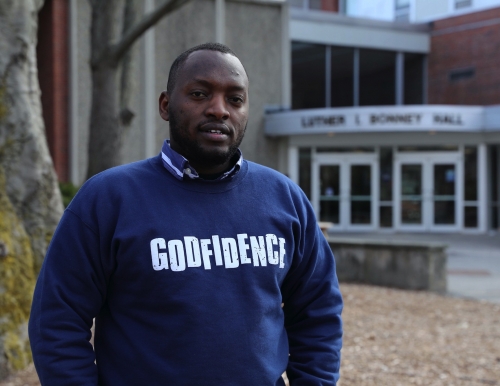
Prudent Ndihokubwayo spent years sweeping up the notes and wrappers left behind in classrooms at the University of Southern Maine. All the while, he couldn’t wait to get his protective hands around the one precious piece of paper he worked so hard to earn – his diploma.
He graduated on Saturday, May 7, 2022, with a bachelor’s degree in English, which is even more remarkable considering he could barely speak English about 10 years ago. The language gap was one of many challenges he faced when he fled to Maine from Burundi in 2011. He arrived only with a few changes of clothes and memories of the family he left behind.
“I didn’t have any plan because I didn’t even know that I was going to come here,” Ndihokubwayo said. “I was not planning to come here. It just happened so fast that, ‘Hey, there’s trouble. You’ve got to go.’”
The threat of “trouble” has hung over Burundi for decades. Burundi is located in central Africa just south of Rwanda. In addition to a border, the two countries also share a history of conflict between the Tutsi and Hutu ethnic groups. Burundi’s government and economy have struggled for stability amid periodic flare-ups of violence.
Ndihokubwayo doesn’t like to talk about the specific reasons for his departure, but the choice was clear when his uncle arranged to send him off to join a small community of Burundian expatriates in Maine. Through those connections, they learned of the assistance programs for immigrants that would make it possible for Ndihokubwayo to start his new life.
USM was one of the few employers that Ndihokubwayo found willing to take a chance on a non-citizen with limited English skills. Even then, his lack of a driver’s license only qualified him to join the custodial crew on a temporary basis.
A voracious work ethic soon made Ndihokubwayo indispensable. He worked overnights and early mornings, whenever and wherever management needed him. On his days off from work, he stayed busy as a student of English as a Second Language through Portland Adult Education.
The name of the class is a misnomer since English is actually Ndihokubwayo’s fourth language after Kirundi, Swahili, and French. Between his linguistic fluency and personal understanding of the immigrant experience, Ndihokubwayo was often asked by his USM managers to help communicate with co-workers who shared a similar background.
“Each connection with Prudent reminds me to pause and practice gratitude for our home we share at USM,” said Kristen Case, Director of Facilities Management for Custodial Services. “He reminds me that we pass people in the halls facing challenges greater than mine. He reminds me to be kind and supportive even when it’s difficult. He reminds me that our past, present, or future challenges will not limit our ability to be our best selves.”
By the time Ndihokubwayo passed his driver’s test, a full-time USM job was waiting for him with an eventual promotion to third-shift manager. Ndihokubwayo’s ambitions, however, went even further. One of the benefits of his new staff position was free access to university-level courses.
Before leaving Burundi, Ndihokubwayo completed a year of higher education with his sights set on a degree in Business Administration. His first instinct was to resume those studies, but he soon found himself drawn to the arts.
“I have goals and dreams that I might not have had when I was back home (in Burundi),” Ndihokubwayo said. “I would never dream to be a writer if I was home because I didn’t grow up noticing people write, but here, there’s inspiration around, and people write and push me to do that.”
Ndihokubwayo is working on a memoir detailing the first 10 years of his life in the United States with sequels planned for each following decade. As a Cinema Studies minor, he’d also love to see Hollywood take a crack at adapting his story into a movie.
His goal isn’t self-aggrandizement. Ndihokubwayo measures success by his ability to inspire other people. For children in Burundi, in particular, he knows how much it would mean to have a role model who celebrates their heritage on the world stage.
“When you have a gift, it’s not just for you,” Ndihokubwayo said. “A gift is like a fruit, it’s like an apple. You never see an apple eating itself. It’s for other people to enjoy. I see my gift as a fruit for people to enjoy.”

